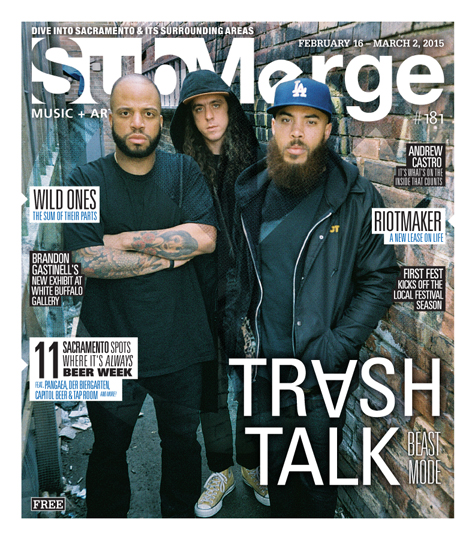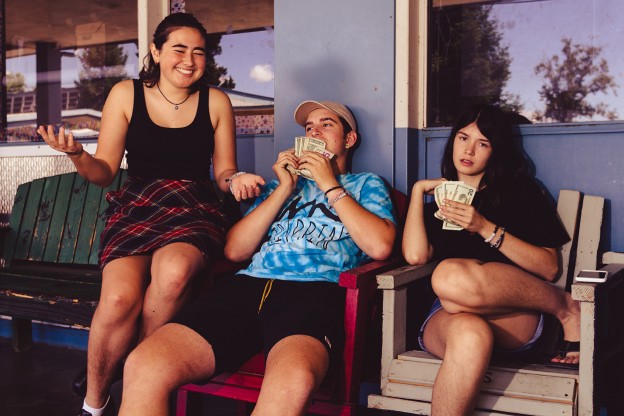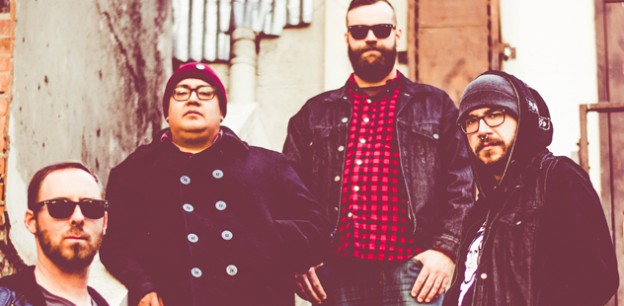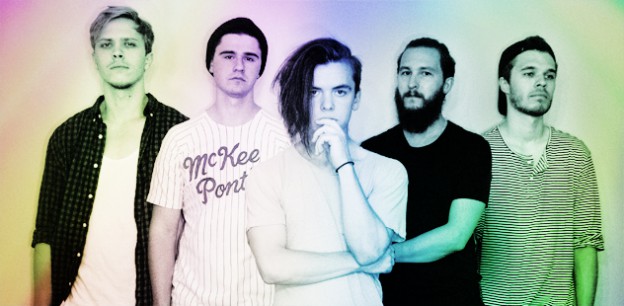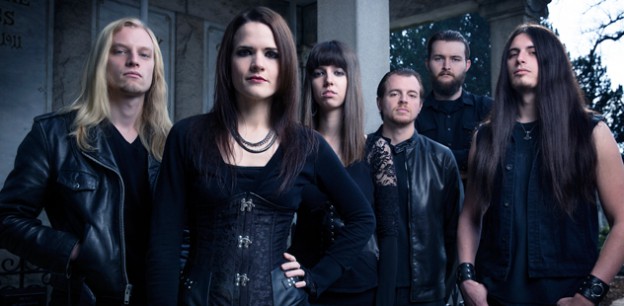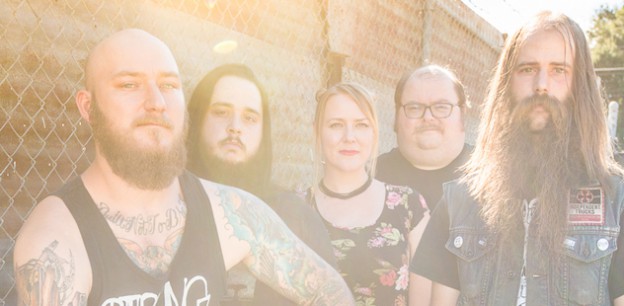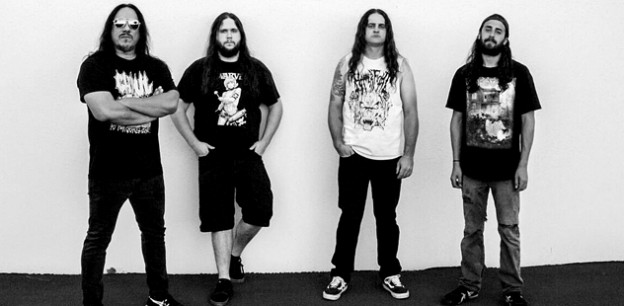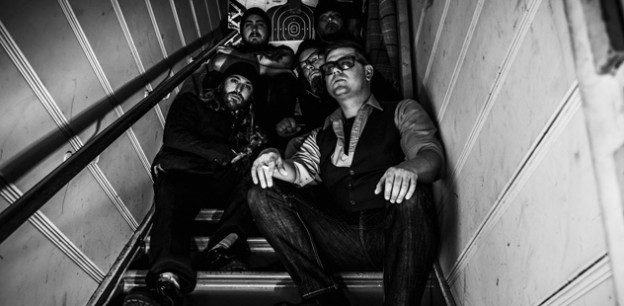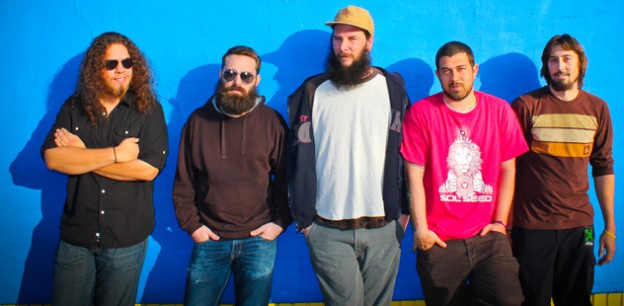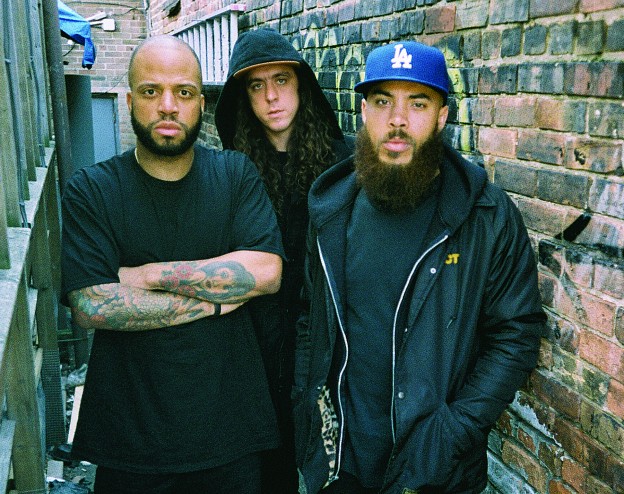Sob Story
Once upon a time, I almost gave up on journalism, mostly because in every interview, bands started saying the same exact things: “We’re going to change the music scene forever, man!”; “We have a unique sound that nobody has ever heard!”; and “We need to up our social media presence!” They said that kind of stuff over and over again, like some bullshit mantra of the perpetually mediocre. Pretty soon, I started hearing the desperate machinery of marketing and branding entering into every riff and melody of their stupid songs. It was no longer music, just a series of dog whistle pleas for Facebook “likes” and networking opportunities. Talking to musicians was ruining music.
It wasn’t until recently when music became exciting again. Bands like Little Tents, Dog Party, RAD, Death Rogen, etc., seem unmotivated by networking and branding, and instead their music—raw, interesting and, at times, funny—resonates with a certain soulfulness, like it comes from a place of pure fun. The fun of playing with friends. The fun of creating rad songs. And when music is fun, fans flock naturally.
Because everybody likes fun, goddammit.
Which is where Destroy Boys come in. Vi Mayugba (guitar), Alexia Roditis (vocals) and Ethan Knight (drums) materialized one day with their scrambled up, punk-ass garage rock—songs ranging from folky to full of angst and rage. And they have magnificent titles, like, “I Threw Glass at My Friends’ Eyes and Now I’m on Probation,” a fast-paced, monologue-heavy rocker with tons of laughs. There are also slower and moodier songs like “Goldilocks Spot” where Roditis wails like a depressed lounge singer. And, of course, there’s my favorite song, the hardcore “30 Seconds of Shit,” which in half a minute makes me want to burn down a police station. For an EP that only lasts about 10 minutes, it’s full of energy and great fun, a much better advertisement for a band than, say, a Facebook post with hella likes or a viral YouTube video of a cute baby doing stupid shit.
The band really sort of sprouted up out of nowhere. One minute Destroy Boys didn’t exist and the next people were super into them. I mean, they have a good collection of songs, they’re releasing a couple singles on Uncool Records and they’ve even racked up two proper shows at 924 Gilman, but, like, where did they come from? The answer is I have no fucking clue. When I went back to listen to the recording of our interview at Temple Coffee, it sounded like a bunch of people yelling, then laughing and then everybody talking at once. My notes look like the scratchings of a nonsensical madman. Interviewing this band is like being inside Ken Kesey’s One Flew Over the Cuckoo’s Nest, but with hyperactive teenagers instead of mildly dangerous crazy people. To get you in the mood, here’s a typical conversation with Destroy Boys:
“We’re basically Rush,” Mayugba says.
“You kind of look like Mick Jagger,” Knight says, laughing and pointing.
“Actually she looks a little bit like Steven Tyler,” I say.
“Steven Tyler! That’s who I was thinking of! I didn’t mean to say Mick Jagger!” Knight yells. “You’re the Gordon Ramsay of Sacramento music!”
“I’ll take that,” says Mayugba.
And then they start yelling at each other again.
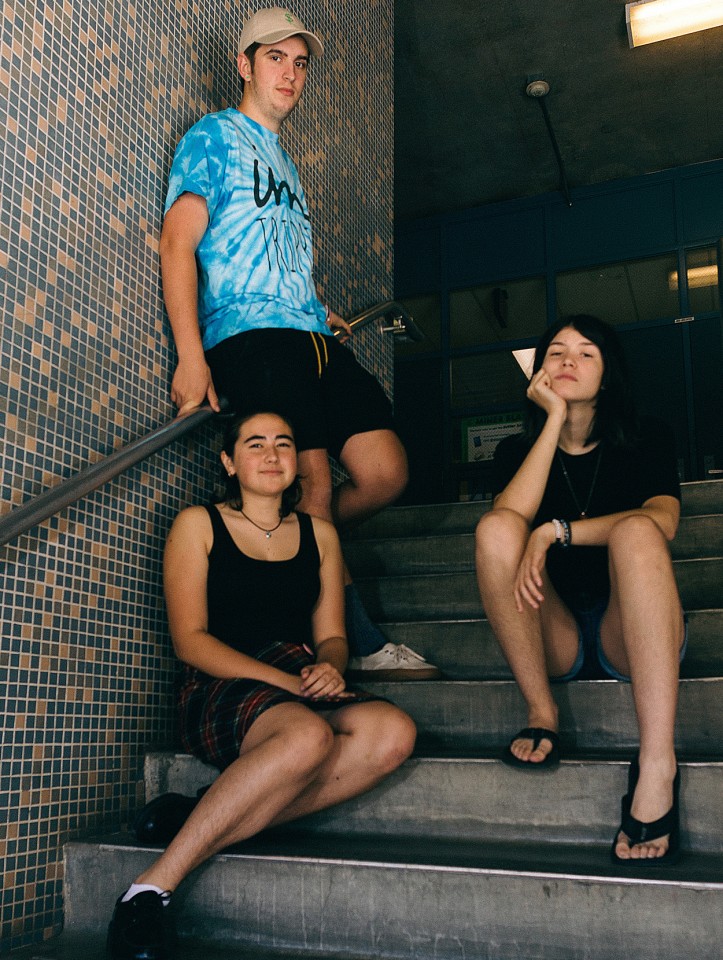
Serious Draw
It’s sort of sweet, the way the band interacts, like a dysfunctional family that can’t tell if it hates or loves each other passionately. Mayugba plays the mother who knows what’s best for the band. Knight is the rebellious son. And Roditis is the responsible older sister, always there to mop up everybody’s shit.
Like a family, despite their dysfunction, they work quite well together. They keep this running list of possible song titles, weird shit like “I Love Dying,” “Jo Jo Binks” and “Texting Won’t Pay the Bills.” Mayugba tells a story about the time she was sitting around with Lucy Giles (from Dog Party) and out of nowhere, Giles gets a really sad look on her face and says, “I like boys, ahhhh!” Mayugba thought that would make a perfect song title, so she wrote “I Like Boys, Ahhhh!” in a section of her phone called “Title Notes.” The whole band compiles title notes and they all draw from the list when they’re out of ideas.
Make no mistakes: The band, however wacky, loud and obnoxious, still wants to be taken seriously. They’re not just a bunch of fuckups.
“I think we all want to be successful,” Mayugba says. “It’s my career of my choice. This project is my baby. I am the manager. I handle all the stuff. But we have a lot of fun with it and I think that’s how we’re going to reach success is being ourselves and having a good time with it.”
“Blah, blah, blah, blah,” Knight interrupts, making wild gestures with his hands.
“No, it’s true!” Mayugba says. “I don’t know if this sounds arrogant or not, but we’re above the tier of another local band. We gather some serious draw—”
“Yeah, that sounds like you’re full of yourself,” Knight interjects.
Mayugba tweaks her statement: “We’re not signed, we’re not selling out venues, but we’re having a lot of fun.”
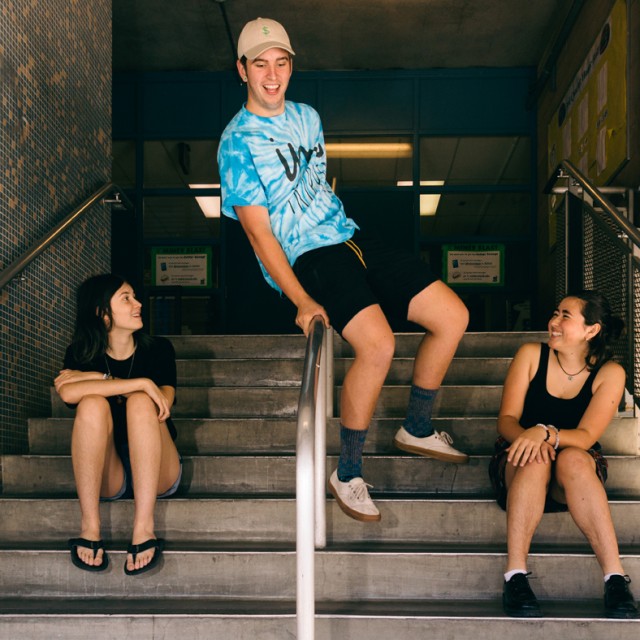
Worn Out Our Welcome
I wonder about the name Destroy Boys, and Roditis tells me that the name has caused a bit of confusion, and even anger, amongst fans. They’ve even been accused of being “feminazis.”
“We get a lot of stuff for our name.” Roditis explains. “I remember at our Naked Lounge show a guy came up to me and he was like, “I really like your set, but, um, where did the name Destroy Boys come from? Do you hate men?” I was like, “Please leave me alone. I’m walking to the bathroom.”
And at this point in the interview, a poor woman sitting next to us on the couch trying to enjoy her coffee and newspaper becomes visibly agitated. She looks at me like, “What the fuck?” and then without a word she gets up and leaves the coffee shop. Without skipping a beat, the conversation somehow turns to white people.
“I hate white people,” Knight pontificates.
“Ethan, you are the whitest member of this band!” Mayugba says. “You are transparent.”
The band laughs and laughs and laughs and laughs, etc.
Catch Destroy Boys June 28, 2016, at Harlow’s, located at 2708 J Street in Sacramento. Together Pangea and Patsy’s Rats are also playing this 7 p.m. all-ages show, with tickets ranging from $12–$14. For tickets and more info check out Harlows.com. Destroy Boys will also play the second annual Sac Ladyfest at Cafe Colonial, located at 3520 Stockton Blvd in Sacramento. The two-day festival goes down July 15-16, 2016, and features 15-plus bands. Learn more at Sacladyfest.com.
Tweaker Dad-Rock
“Oh, so I can get comfortable?” Andy Harrison asks as he lights up a smoke. He’s up in my studio space, and it’s cold AF. I’m laughing at everything he has to say as I get acquainted with my audio recorder, some out of nervous habit, some because Harrison is just an amusing kind of guy. I’ve asked him to come up and talk about how things are going with one of his bands, Peace Killers.
I’m able to come to some sort of compromise with my digital device where it allows me to record a conversation so long as I keep it hanging precariously off the table edge. We both continue smoking as I rattle on about some nonsense, organizing some notes.
(Subsequent to sitting down with Andy, I was able to get a few answers from bass player Alex Dorame via email).
Harrison and his bandmates are steady faces in the Sacramento music scene. They started Peace Killers in 2012 as a couple of their other projects at that time were winding down.
You’ve most likely seen Harrison if you walk around town or frequent bars. He is a face among the line at the bar, the line to the bathroom, on the stage, talking to ladies and making them smile, etc. I can guarantee you if Ground Chuck sees him, it’s hugs-on-sight. I’ve long admired his effortless charisma. Harrison’s other band, Celestions, have been engaging crowds with their straightforward, driving, soul-influenced rock ‘n’ roll for years. It stands to reason that this endeavor would also showcase Harrison’s knack for catchy hooks and melodies, albeit in a different tone.
Having some songs, a general idea and some bandmates, the band recorded some demos with Pat Hills at Earth Tone Studios in Rocklin. Hills and his Pepsi-sweet Midas touch have blessed some excellent recordings by artists like Tera Melos, King Woman, Number Station and the Hanover Saints to name a few.
Peace Killers garnered some Internet buzz and began looking at labels that might put out the record. After some deliberation, the band decided that heavy music label Svart felt like the most promising. Svart is known for putting together a solid roster of heavy, sludge-driven doom and metal artists, as well as straight-ahead ‘70s psyched-out occult metal and experimental, atmospheric black metal. From Jex Thoth to K-X-P, from Tahtiportti to Dakhmandal, Svart has put together a diverse roster of bands.
Fast-forward to now, Peace Killers have just finished a video for the song “Devil’s Daughter,” with the help of Kill The Precedent’s Jesse Mitchell. The freshly dressed and configured new vinyl LP will be out Jan. 22.
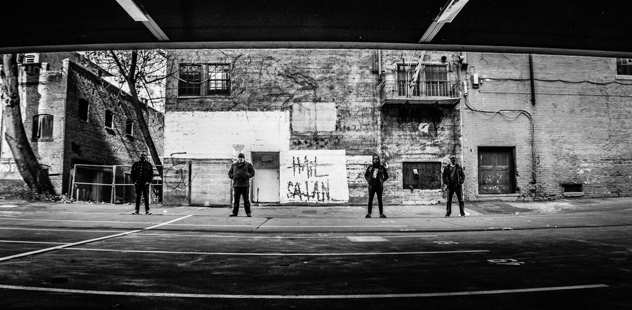
What were some of your influences writing the songs for this record?
Andy Harrison: I really wanted to emulate Uncle Acid and the Deadbeats as much as I could. There’s sort of the obvious Sabbath nods. I think a lot about Queen, Queens of the Stone Age, those are kinda my immediate influences. At least for me playing guitar, some of my influences go back to Frank Zappa, the Allman Brothers, sort of big rock sounding guitars that doesn’t necessarily suck its own dick too much. Definitely a lot of blues influence, but trying not to do a straight-up dad-rock influence. I don’t mind dad-rock. The other band, the Celestions is sort of a construction-dad, Springsteen influence, and this band is sort of a straight-up, dead-beat tweaker dad-rock sound.
Alex Dorame: I feel there’s a lot of everything you can hear on our record. The bands that stand out to myself as influences range from Thin Lizzy, early-Iron Maiden, Motorhead, Murder City Devils, the Doors, up to the Cult. Also, Black Sabbath, the Melvins and maybe even the Smut Peddlers.
What Sacramento bands would you get together or resurrect to play a show?
AH: Holy shit. Black Mackerel.
AD: Black Mackerel!
AH: They’re one of the reasons that I even thought “maybe I should try playing some heavier shit.” I thought “we’ll start a three-piece and tune down”. So maybe if they’re reading this they can get their shit together and play a show with us. I think our drummer would probably say FAR. Tales of Terror.
AD: I would love to see Hotel Pistol, the Diseptikons, Filibuster, the Union Hearts, Who Cares, and Pocket
for Corduroy.
Who did you get to do the album cover?
AH: Her name is Annie Hooker. I saw a print of the buffalo head in the home of Celestions drummer Gabe [van Dyke], and I loved it. It represents something heavy, and hard charging, and noble, and western. We just kinda decided it was a good spirit animal for the group.
Is there a concept for the album? Is there a theme?
AH: I think probably the most consistent subject matter throughout the record is party fatigue, or how it takes you to strange, dark places living a hedonistic lifestyle.
We cover “Spoonful,” a Willie Dixon song. You know it’s kinda about people trying to get their fill on lusts and desires. You know, I’m not an authority on the song, but that’s kind of what I gathered from it.
What about a rock album now grabs your attention more than an album would have when you were maybe 21?
AH: Definitely the sonic qualities of an album, the way a melody is constructed. I find it harder and harder to relate to someone’s really personal lyrics, I don’t so much write myself into those stories. I need a hook, some sort of balance, some sort of syncopation, some sort of danceable rhythm. Even in heavy music, you know, it’s still there.
But yeah, not so much the lyrical content anymore. You know, I used to get really into Elvis Costello’s lyrics when I was really young, and analyze the shit out of them, and I still appreciate that, but nowadays … like when I listen to a band like Fuzz, it’s just so balls-out, and free, and rockin’. Higher voices, higher, rougher sounding voices, somewhere between Alice Cooper’s rasp and Freddie Mercury’s range.
What’s one Fuzz song you would want people to hear?
AH: “Loose Sutures.”
Peace Killers’ self-titled debut album is out on Svart records on Jan. 22, 2016 you can preorder it now at Svartrecords.com. Their album release show is Jan. 30 at Harlow’s with Kill the Precedent, Psychosomatic and The Number Thirteen. Go to Harlows.com for more info or to purchase tickets.
Sonic High
What do you do when you are raised on classical music, majored in music in college and played the flute in high school? Start an electronic dream pop band, of course.
That’s exactly what Jeremiah Tsering did when he and four friends—Mark Johnston on guitar, Phillip Moskalets on bass, Dave Moskalets on keyboards and Mark Tuzman on drums—launched The Good Fortune last summer.
“I’ve always had an urge to write, since high school, which was not that long ago. I started playing guitar first then my goal switched over to writing because I kept having all of these sounds playing in my head (I sound like a crazy person), but eventually I was around some people who inspired me to just start recording,” Tsering says.
This urge eventually metamorphosed into a full-on musical effort when Tsering and Johnston were approached by a friend to fill a last-minute slot at a show at Lounge of Life. The fortuitous event would prove to be the catalyst from which The Good Fortune would emerge.
“It was kind of an accident, we had a friend who asked us to play just this one-off [show], and we did a bunch of cover songs and a couple of originals, and it went really well,” Johnston says. “The band meshed really well, and [we] just decided to roll with it because we got a really good reaction and then we accidentally became a band, and it’s been fun.”
While each individual member of the band wasn’t new to the music scene (all five have played in other musical projects and bands), they admit that throwing together a quick set list and forming a band on the fly was a challenge, but one which they fully embraced.
“It was the most bizarre, euphoric thing, Johnson continues. “We walked on stage having no idea what was going to happen and thinking ‘Let’s hope they like the cover songs.’ And people were dancing, people really got into it and we walked off stage and into the green room and we just looked at each other like, ‘That really just happened. OK let’s do another one of these.’ We thought it was going to be a one-off but it was the best. There’s an intangible to getting off stage and going ‘People who I’ve never met in my entire life just liked what I did.’”
The accidental band then forged on, playing shows at small venues and cultivating and honing their lush, dreamy sound. Soon the fivesome were being invited to play at larger gigs, culminating with a performance at this summer’s THIS Midtown block party, a stint at Sam Sascha Keshavarz’s Le Twist Tuesdays dance party and a slot on the bill at the Submerge Presents Lipstick! New Year’s Eve party at Old Ironsides. But all of the attention hasn’t distracted the band from their mission to bring a soulful and thoughtful voice to the local music scene.
“I always had this dream of playing in a band and bringing a team with me and not doing something super selfish—there’s a lot of people out there who write and say ‘It’s all about me,’ so I think it’s really cool when you can do something and involve other people and they can find their role and everyone kind of grows with you, and that’s what it’s been like so far,” Tsering says.
The longtime friends cite their diverse musical backgrounds and interests as the spark that ignites their collective passion for bringing their distinct vision of music to life—a vision that strives to balance professionalism with a collaborative spirit where all of the players are empowered to have fun and enjoy themselves.
“We all respect each other as musicians,” Johnston says. “Our bass player Phil has surreal amounts of talent. He’s incredible. One of the other guys in the band, Dave, he was in Nashville like two years ago writing country music. Jeremiah grew up listening to a bunch of progressive, indie rock bands, and I grew up listening to metal and hardcore. But all of those influences … and all of us really respecting each other’s musical backgrounds, and really liking the central vision for what we do, makes it such a fun experience.”
The band’s first EP, Social Crowns, was recorded in Tsering’s home studio and was comprised of a collection of songs that the singer-songwriter had been amassing since his senior year in high school. The experience of writing and recording was a therapeutic experience for the singer, who admits that the process helped him get through a bout of depression and that the music is more than just catchy verses and tunes.
“A lot of those songs I started writing even before we got that first show—probably like a year in advance, in total,” Tsering says. “I’ve been writing pretty consistently since senior year of high school. When music really affects me it bypasses all of the senses and goes straight to the soul and emotions, and it’s almost like a high, it’s crazy. My goal is to have real-life messages that we talk about, that make people think about the lyrics, not like, ‘Oh, this is a catchy tune or this is a catchy verse.’ I want people to think about it a little deeper and maybe understand the meaning of the song or question what it’s about.”
And that is what is at the core of TGF’s musical philosophy—a longing to encourage an honest and thoughtful dialogue about everyday life that isn’t pretentious or isolating that celebrates Sacramento.
“I actually ranted about this the other day on Instagram,” Tsering says. “I see Sacramento as we’re laying a foundation for something, and I feel like a lot of other cities and the world has kind of looked at Sacramento as a second-class city, and I like that. I’ve always felt like the underdog, I’ve always felt like I didn’t really have everything but if I was diligent enough I can go ahead and get to the place I need to be, so that’s where I see Sacramento. Especially with festivals like TBD and how that’s growing, and I see the growth of these things and I just want to be part of it and contribute as much as we can to show people that Sacramento isn’t some random city that you just pass through; we have culture, we have a lot of great things.”
The bandmates’ love for music and the magic that a live performance can conjure is also at the center of what they want to bring to the vital Sacramento music scene. As the band looks to the new year, they’re encouraging themselves to continue to push forward. They’re currently working on news songs and hope to release their first full-length effort next year while also embracing the DIY ethos that is at the heart of the new music business by looking to create a series of music videos on YouTube. Oh, and if we’re lucky we might even see Tsering bust out the flute during a future performance.
See The Good Fortune live at Old Ironsides as part of the Lipstick New Year’s Eve party, presented by Submerge. DJs Shaun Slaughter, Adam Jay and Roger Carpio will also be on hand. Admission is just $10 and the party starts at 9 p.m. Go to Theoldironsides.com for more information.
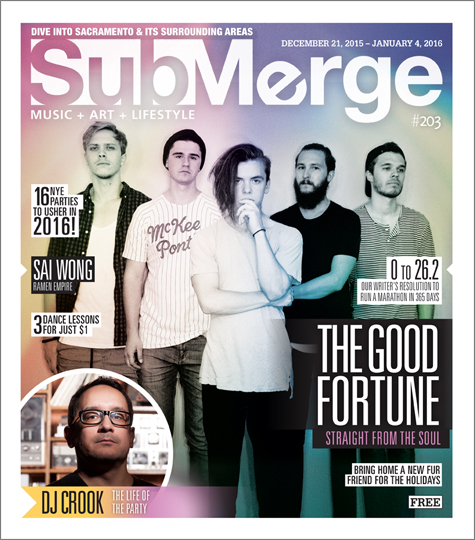
Bring on the Night
The rise in popularity of symphonic metal and its many musical subgenres over the last two decades has been alarmingly substantial (to say the very least) both in the United States and abroad. Not only have many bands in the genre been catapulted into arena and stadium headliner status, the once-underground style has now become one of the strongest concert draws on the touring circuit.
Unfortunately, groups like Nightwish, Epica, Within Temptation, Delain, Xandria, Leaves’ Eyes, and many others get unceremoniously lumped together since they all have a lead female vocalist. Upon further inspection, however, it would seem the similarities of the aforementioned acts are also rooted in a melodic approach that takes cues from classical and progressive music.
Sacramento’s Graveshadow is one of the few female-fronted symphonic metal bands in the region to have successfully incorporated elements of gothic, black, thrash and even doom metal fare with great effect. Rather than sounding dated or derivative, the eight songs on their forthcoming record, Nocturnal Resurrection, show a band ready for the road and, more importantly, world domination.
Since their inception in 2012 by guitarist William Walker, the group has become one of the area’s strongest and most consistent headliners and have already signed a deal with Belgium-based boutique record label Mausoleum Records. The label was founded in 1982 and previously released albums by Voivod, Anvil, Nazareth, Omen, and has many other heritage rock acts and newer signings.
Whether you’re into brash screams or soaring vocals, standout songs like “Exhumed” and “Namesake” offer something for everyone. From mid-tempo rockers laden with keyboards to plodding guitar riffs that complement a wholly able rhythm section, this is one band that has benefited greatly from a twice-a-week practice regimen.
And while the group has no immediate plans to leave the area, it would seem they are poised for bigger and better things outside of our fair city.
Submerge caught up with vocalist Heather Michele, keyboardist Valerie Hudak and Walker to get the skinny on Graveshadow’s new album and more.
It seems your album is already out overseas. What is the exact street date of Nocturnal Resurrection and why did you choose your current label over doing things yourselves?
William Walker: You are correct. It was already released back on Nov. 13, 2015, in Europe, but it will be available everywhere starting on Dec. 13. Oddly enough, a friend of mine named Norman Skinner was in a band called Imagika that toured and were on the label. When I knew they were signed, it made me feel really good about the label since it seems they had a good experience. We are signed for one album and the label has an option to release a second album if they want to. We are fully committed to this album since we spent much time, effort and money to make it. The album was mixed and mastered by Emil “Nightmare Industries” Nodtveidt from Sweden. He is also currently the guitarist of Deathstars who shares the same management as us—Jeff Keller Management. It worked out really well, and we couldn’t be happier with the results.
What about bonus tracks? Surely you’ve recorded some extra tracks to use later on.
WW: Actually, we only recorded the ones you hear on the new record. We went into the process with the idea of recording just these songs and nothing more. Our drummer Roman Anderson and I tend to write all the rhythms together and thought it best for consistency. Consequently, all of the rhythm guitar tracks you hear were recorded by myself and the leads, of course, were done by our lead guitarist, Matt Mitchell. However, all of our songs are very collaborative since everyone adds something.
Valerie Hudak: We have a couple of different remixes of “Blood and Fire” we were thinking about using for digital download cards. Unfortunately, we had no extra songs on the record. It is something we thought about doing later on. Currently, we’re focused on writing even more songs for the next record.
Which song or songs are your favorites?
WW: I really like “Namesake” since I wrote and arranged all the guitar and the lyrics. I love playing that song. It was a very emotional song written after my grandfather died and deals with some of the issues I experienced afterward since I’m also named after him.
VH: I really like “Namesake” as well. I like the construction of “Namesake,” which has some really good riffs in it and “Winter’s Come to Call” as well. The most difficult problem I encountered while recording was dealing with all of our many tempo changes, because we’re really a live band. When you do a studio recording, you have to set the rhythm, set the click and play to it. You really have to give a perfect performance, unlike a live show.
Heather Michele: I would say “Lycan Lust,” which was a tricky one to finagle around. I was given a sheet of paper with what the song was supposed to be about. As it turned out, I liked some of the notes, but I wanted to phrase things differently and change things around. It was one of the most difficult to write but ended up being one of my favorites.
How did the band originally meet? Please don’t tell me Craigslist.
HM: [Laughs] It was a Craigslist ad. I talked to Will initially. The founder was Will and another member who is no longer in the band, whom we haven’t spoken to in quite a while.
Where have you played outside of the area and what plans do you have for 2016?
HM: We’ve played Reno and we played Hollywood a couple of times. We originally played with Edge of Paradise and have been getting shows in Southern California through promoter Metal Sanaz.
WW: We don’t have an agent overseas yet, but we do have a national tour booked that’s not announced yet. Unfortunately, I can’t say who it is, but it is a short tour with a well-known national act and another one of our favorite bands. We’re opening first of three. Also, we now have a proper booking agent here in the States named Andrew Roesch, who also works for Artery Foundation. He will start working us and booking stuff the beginning of next year. From the conversations we’ve had with him and our manager, we all decided the band wants to simply play out-of-town markets opening for national acts. Later on, however, we’d to like start touring nationally after we’ve built up something.
Which bands are you fans of whether regional or local?
VH: We really like Crepuscle. They are really good melodic death metal from Redwood City. They are also playing our CD release show.
WW: Astral Cult are a great band from Folsom, and they’re also playing our Boardwalk show. I also like a band called Blessed Curse. We just recently played a show with them as well, and I was really impressed.
What do each of the members do for work during the day?
WW: I work at Apple on the Elk Grove campus, our drummer Roman Anderson sells car parts, lead guitarist Matt Mitchell does political analysis and our bass player Ben Armstrong works at a plant nursery.
HM: Valerie and I actually work at the same company at different locations. We’re tutors for kids with autism from 2 to 6 years of age.
What is the end goal for the band?
WW: I have been playing in bands since I was 13 years old. All I ever wanted was to make a living off making and playing music. I would totally quit my job.
VH: I totally feel the same. We are 100 percent into this. I would really like to make Graveshadow my only career.
HM: I would just like to make a living working part-time and be in a band. I take it back. If I could work at Starbucks, be in a band and be self-sufficient, I would totally be be good.
WW: Heather’s idea is my fallback plan.
Mausoleum Records recording artist Graveshadow will host a CD release show at The Boardwalk located at 9426 Greenback Lane in Orangevale on Sunday, Dec. 20, 2015. Tickets are just $10 in advance. Crepuscle, Zeroclient, Conceived in Chaos and Astral Cult open the all-ages show. Doors at 6 p.m. and the show starts at 7 p.m.
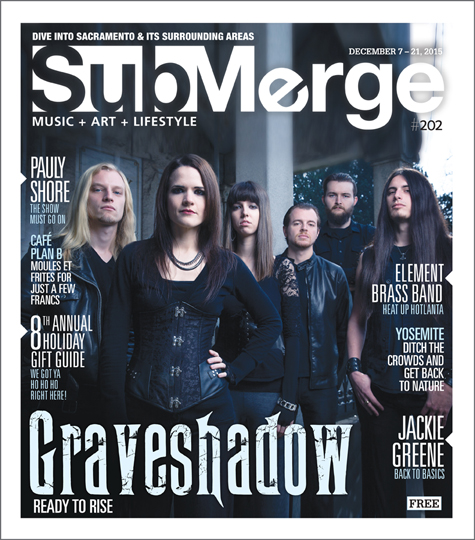
Sacramento Doom Band Readies Vinyl Debut
If 2015 was shaping up to be a big year for Sacramento psychedelic doom band Church, it’s turning out to be an even bigger year for Sacramento psychedelic doom band Chrch. The two bands are strikingly similar. They both have the same mononymous members—vocalist Eva, guitarist/vocalist Chris, drummer Matt, guitarist Shann and bassist Ben—and both play the same songs, with the same titles. In fact, the debut Church full-length released earlier this year on cassette by Transylvanian Tapes, Unanswered Hymns, is the same as the debut full-length Chrch record set to be released September 28, 2015, on vinyl by Battleground Records and celebrated by an album release show October 3, 2015, at Starlite Lounge. So what gives?
As it turns out, along with the parts of making a name for yourself in international music circles that rule—having labels put out your records, getting tons of rad press, getting to open for Pentagram, etc.—there are some downsides to having your band thrust into the broader musical zeitgeist. Namely, threats of litigation from bands who find your name a bit too close for comfort.
“It was a month or two ago,” remembers guitarist Chris. “I was asleep and Eva our singer came over, banging on the door. She got let in, came in and woke me up, like, ‘Dude, David from Battleground just called me, the lawyers from The Church just sent us a cease and desist!”
The Church is an Australian band who found limited international success in the ‘80s, but has mainly been relegated to cult status outside of Australia. This, however, didn’t stop The Church from threatening to apparently pursue legal action against Church if they continued to operate as a band under that name. So, Church became Chrch, and the forthcoming release of Unanswered Hymns on vinyl became something of a debut do-over.
Thankfully, the loss of a vowel, a website, and a couple of years worth of band-name recognition hasn’t put a stop to the band’s forward momentum. As Chrch prepares to release their album on vinyl and hit the road for some high-profile shows to close out the year—including the third installment of LA-based Midnight Collective’s annual Midnight Communion, Nov. 13, 2015 in Long Beach—2016 is looking to be an even bigger year for the band, under any name.
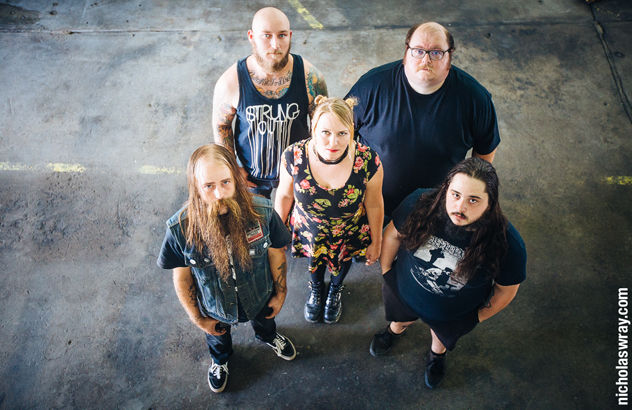
How did Chrch get started?
We’ve all known each other for years. I used to play in a band, in high school, that used to play shows with our other guitarist all the time. Our bassist was in a different circle of friends that I met through music; I went on tour with my friend’s band that he was also friends with and we were both on tour together. That was probably five years ago. Through him, I met the singer … We’ve all just been around in the scene for awhile. Sacramento’s pretty small; everyone sort of knows everyone.
Did you know, at the outset, what sound you were going for, or did you just sort of start playing and waited to see what would happen?
We all knew that we wanted to play in a heavy band, that we wanted to play doom, but we didn’t really know what direction it was going. There are so many different kinds of doom, so many different sounds in that one genre. Really, we just play what we want to play and it just kind of comes out all similar.
When did you start thinking that maybe this band was gonna be something special?
Kind of from the beginning. Our first show was with Bell Witch, which was just already crazy; we’ve all been fans of that band for awhile. From that point, we got really good shows right off the bat. Then we played with Dispirit right after that; a month later we played with Eyehategod. People started to see our names on flyers, like, “Who the fuck is this?” then checked us out, and we got a really good response, right from the start. Even this month, just as far as playing shows … I mean, we just opened for Pentagram, which is fucking crazy for all of us.
As far as the name, I’m sure it’s not that cool for you to be threatened with a lawsuit. But in a certain sense, it’s kind of badass, like “Whatever, we’ll just take out a letter and soldier on.”
I mean really, there’s a part of it that’s kind of flattering. This band from the ‘80s that is not even relevant any more, that I don’t think anybody gives a fuck about, feels threatened, or something by us. I don’t know why they would send us a cease and desist. They’re like a new-wave band. There’s no similarities at all. But they still think we’re encroaching on their business.
How has the response been to the record so far?
It’s been crazy. It’s been kind of overwhelming. We just kind of recorded it as a demo, but then labels picked it up.
Seems like the record has been getting really good press, like that review on the Roadburn festival website. Has that been just a matter of getting the record in the right hands?
Yeah it’s all been by chance basically. When we got the record deal, we got a press agent along with it, Cat from Southern Cross PR. So she’s helped a lot along the way. But a lot of it has just been somebody coming across our stuff online, on our Bandcamp or something, and liking it. That’s what happened with Roadburn. Walter, the curator of Roadburn, one of his friends, some guy in England reviewed it, and Walter saw the review and was like “Oh shit, I gotta check this out” and then liked it and put it on Roadburn. James from Transylvanian Tapes has been doing a lot too. We’ve been on Australian radio, which could have something to do with why The Church sent us a cease and desist. But he’s gotten us on a lot of blogs that we didn’t even know about. We find something new every day.
It has to be a good feeling, to get noticed worldwide.
Yeah, its cool. None of us had planned on doing this. We’ve gotten a couple of tour offers that we’ve had to turn down, because everything’s moved so fast. It’s definitely overwhelming, but it’s cool. Especially being from Sacramento, a city not necessarily known for its doom scene.
Have you noticed that changing at all, or is it still an uphill battle for your kind of music?
It’s definitely better now than I feel like it’s been in recent years, but it’s always kind of an uphill battle. Sacramento’s hard. But it’s definitely a lot better than it has been in a long time.
Celebrate the release of Chrch’s Unanswered Hymns on vinyl on Saturday, Oct. 3, 2015, at the Starlite Lounge with Acid King and Cura Cochino, as well as interludes provided by Noctooa. Show starts at 8 p.m. and is 21-and-over. For tickets, go to Atlanteancollective.queueapp.com.
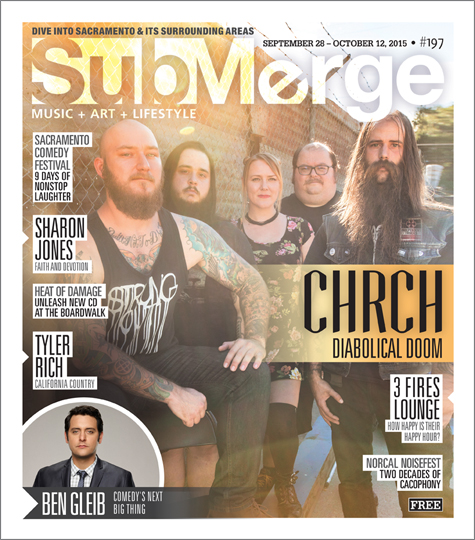
Hustle and Thrash
In the mid- to late ‘80s, D.R.I.’s Crossover album comes out, Slayer’s Reign in Blood was annihilating everyone and the “Night Stalker” Richard Ramirez was finally behind bars. All over California, skateboarding and thrash metal were influencing young punks like Jeff Salgado and his friends, who would eventually start Psychosomatic.
Today, the band members live in Sacramento, and they’re really doing it. With more tours ahead than anytime in the past, they are a testament to “stand by your band.” Or van, for that matter.
Salgado is the band’s founder and vocalist/bass player. He looks like the older, metalhead dad at the skatepark, who’s really patient and encouraging, but looks sort of alarming to the other parents because he has long hair.
I met up with Salgado last Friday. His role as the band dad felt apparent right off the bat. He annotates most of the things he says with how excited he is, and how grateful he is for opportunities that have been presented, and that stuck with me. The band dad is in charge of morale; he has the grey hair to prove it.
“It’s been non-stop since June,” Salgado said. “When I’m not working or spending time with my family, I’m working on the band … We did a video, contacting people … And when you’re booking a tour you have to touch base with people. You don’t want any of your dates to fall through, and if they do, you have time to scramble to make something work.”
Salgado sees the band as finding its stride now more than in the past, with a solid, committed lineup, a new record, even Psychosomatic skatedecks.
“It’s a new birth, a new band. Since then, we got the right pieces as far as band members go, and it just clicks like it never has before.
So it does feel like a new band and we’re all equally excited.”
Part of Psychosomatic’s shifting dynamic is due in part to Toby Swope, who had been the band’s drummer since 2001, taking on a new role as the band’s lead guitarist. Swope is also new drummer Jared Klein’s half-brother. Dan Mills rounds out the group on guitar.
“In the past we had members that were not 100 percent committed, now we do,” Salgado explains. “I am so grateful that I have these guys to play with me. I told them, ‘Don’t just play in this band; own it. Make it your band.’
I know that Jared’s really happy to play with his little brother.
“Toby can do anything musically, he’s just unbeatable,” he continues. “He just did a North American tour with Revocation, he’s written 90 percent of the guitar parts and music on this new album.”
Sacramento’s BuriedinHell Records is releasing Psychosomatic’s newest album titled Clicking Sound of a Hammer Pulled Back, an effort Salgado sees as darker and more serious than previous recordings.
“We’re older now, we’re more mature,” he says. “It’s serious and darker, whereas the other albums were more wider range with the skateboard-party feel. This one is more reclusive, and serious. There’s one song at the end where I really went deep in my own insecurities, and I put it on a song where I had never done that before. It shows that I’m not just a shell of hardness, I have vulnerability, which I don’t like to express. But in doing so, I felt better about the song.”
The album is a jarring meld of metal and punk in a simple format that can be appreciated by fans of other albums, like Hoods’ Pray for Death album or Diseptikons’ Solutions Supported by the Angry.
Taking shape in the fertile soils of Salinas, the band played locally, mostly parties, traveling to bigger cities to play to more people. By 1998, they all made the move to Sacramento where they soon found footing in the local music scene.
“We were just a bunch of skate kids back in the day that started a band. We had played the Bay Area, but we had never played in Sacramento, so we didn’t know what to expect. Coming from Salinas, you had to drive to Santa Cruz at a minimum to see a good show. Otherwise, it just seemed like we were playing parties, and it wasn’t worth it; we had to get out of there. I was 28 years old, and I came here with pretty much nothing but my band equipment. I had to start over from nothing, and it was totally worth it,” Salgado recalls.
These are not some, fly-by-night, wango-tango boys. These guys have been ripping the heaving bowels out of the soft center of California with their thrash metal assault for nearly 30 years, with four U.S. tours, soon to be five, as well as several other package tours yet to be announced.
Thirty years worth of driving to local shows and numerous tours can destroy any one van, or two, or three. It takes a certain kind of love to keep the same van purring warmly.
“One of my best friends is a diesel mechanic, so he services it every time we go out,” Salgado says. “The Ford van is nothing to him, he works on diesels, so this is like cake to him. He can figure out anything having to do with the van, so we’re lucky.”
Over time, the desire to make things more functional in a tour van may lead to some modifications. One common tour van amenity add-on is a wooden bunk/loft which can serve as a sleeping platform and storage shelf.
“We had a loft at first, but it ended up being a hassle more than anything, getting the gear out. So what we ended up doing was getting a trailer, so we can spread the gear around. If you’re driving a full U.S. tour, you’re gonna be spending a lot on gas anyways. We keep it really simple and basic, and accessible anywhere you need to be.”
Before he left, I asked Jeff if there was something that the 2015-him would tell the 1988-him just starting a band, and he said, “Get over your personal shit, and work your ass off. Period.”
This is fitting advice for any budding musician, or artist in general, from someone a little older. Get your shit together.
Psychosomatic are headlining Blue Lamp Sept. 18, 2015, for their tour kickoff/CD release, with Kennedy Veil, Jack Ketch, Solanum and xTomHanx. Tickets are $10 and can be purchased through Bluelampsacramento.com.
Wild, Wild West
Every Wednesday night, The Ghost Town Rebellion meets in a backyard oasis off of 21st and C streets for what they like to call, “Decompression Chamber Wednesday.” It is a weekly ritual reserved for the band to practice songs, tell stories and bond over grilled foods and alcoholic drinks.
Those Wednesdays usually go down like this: The five members of the band huddle around a triangle table filled with Sol beers and an obscure tequila bottle. They steal cigarettes from one another in a chain-smoking frenzy, only breaking the cycle to readjust their stringed instruments or dress a hot dog with condiments. Sometimes, you will see guitarist/banjo player Justin Forcione show off his undeniably impressive ability to play the guitar with his front teeth.
These Wednesday indulgences, however, hold a deeper purpose than the above-mentioned. To The Ghost Town Rebellion, Wednesdays represent band bonding, jamming and perhaps what sets this band apart: storytelling. Aside from being tons of fun, these rocker dudes can also be considered really unorthodox educators. I would like to quote Kevin Hart when I describe what it’s like to listen to this band’s lyrics: “You gonna learn today!”
Shawn Peter, lead singer of the band, is a Downtown Sacramento Community Service Guide head and Historical Supervisor. He has been dedicated to Sacramento’s history since 2000, when he was recruited to develop a historic walking tour program for the region. He continues to be the head supervisor for what turned out to be a very successful program. Peter’s knowledge for all things Sacramento, whether ugly or prideful, worked as the seeds that helped his sound garden grow. The Ghost Town Rebellion tells Sac’s history though its songs thanks to Peter immersing himself in this city’s history and being inspired by it enough to incorporate it into his art.
“The band name itself is supposed to have a dirty feel,” says Peter, “It represents the ghosts of the area telling their stories. There’s a heavy emphasis on the Wild West, and the rebellion of Sacramento and its people. With that, it is also a true urban city which honors its wild and pioneering past on all levels of development.” Peter would find himself writing songs about the elements of Sacramento’s past that intrigued him most, which he then would share with the band. “They would love the concept. It’s just plain fun. I would pick an idea, place or person and the event surrounding the subject and we would turn it into a song.”
The band’s current EP, Ghost Town Rebellion: Volume 1, is a five-song historical chronicle of the city. “Poverty Ridge,” refers to the area around 21st and T, where Sacramento’s only hill is. The song tells of an incoming storm and floodwaters threatening the more impoverished part of town in the earlier days. “Poverty Ridge” documents the struggle of the poor running uphill to escape floods caused by rising levee waters.
Another song, this one particularly scandalous in nature, is “Murder on Grand Island.” This tune is about a crooked businessman, the county assessor to be exact, and the messed up ways he maintained a fat wallet. This real-life character would set up murders around town and methodically capitalize on them. He would find male landowners who had no next of kin, have them killed, and swoop in on their properties, among other assets; Sacramento drama, old school edition. The guy was eventually caught and as the song says, “… but the evidence was against them / And the town, they all, hanged them high! Hanged them high!” Here’s another weird fact I learned from this song: Sacramento practiced hanging all the way up until 1915. Ew!
The band’s songs are pure rock ‘n’ roll, with a dash of blues and a hint of Americana. Throughout the EP, the banjo somehow steals the show. To be completely honest, I never thought I would say that; but listening to the lyrics paired with the banjo in the blues context just worked so well. Peter has more of a straight-forward voice and is an audible lyricist. You can definitely hear his roots as an emo/punk rock musician.
There are decades of music experience among the five members of The Ghost Town Rebellion. Each of the guys are in at least one other band. Bassist Sean Navin says, “The band got together so seamlessly and almost effortlessly. When this particular lineup got together, we didn’t miss a beat and were playing shows within a matter of days.”
The mutual affection is also noteworthy in this group; imagine a band where everyone looks up to each other. The only negative event was in Reno a few months back, when Peter broke the hearts of his fellow bandmates by not helping them build a fort in their hotel room after a show.
“We moved the two queen-sized beds together so we could even sleep puppy-dog style after! We were ready to use the linen to build the sickest fort ever. Shawn ended up going downstairs and sleeping in the van,” says Forcione while eyeing Peter with disappointment. Other than the comical and disheartening fort incident of early 2015, the band is a true brotherhood of history and musical admiration.
Ghost Town Rebellion: Volume 1, is the first in a series of three being released in the coming months. The releases will continue to chronicle Sacramento history and channel the band’s rock roots into the effort.
“Musically, they’re gonna be different from each other, but the same lyrically,” says Peter about the other two EPs in the series.
Musically, the band has been developing a more bluesy and swampy sound that will be apparent with the use of more instruments like the slide guitar and the trumpet in the next releases. They will also mix up vocal varieties, with Justin Forcione and Darrell Hukill stepping in to front songs.
“The reason why we chose a three-part EP is because we want to stay excited and focused on sections of the music,” says Peter, “We will be telling more stories about the city and the West Coast. We have 160-plus years of inspiration!”
You can catch The Ghost Town Rebellion at the very fitting and historical Old Ironsides on Aug. 14, 2015, for their EP release. It’s Ladies Night, so all you queens get in for free! To make things even better, the first 100 people will get the EP for free. You can also check out The Ghost Town Rebellion at Theatre DeVille in Vacaville on Aug. 28 (with Lonely Kings and MDSO). Tickets are $8 and can be purchased at Devillevacaville.com.
This Band Walks Into a Bar …
So, two fat guys, a Mexican and a Japanese girl start a band…
What’s the punch line you ask? Dead Dads.
“Yeah, Dead Dads is the punch line,” Tony Silva of the Sacramento pop-punk band Dead Dads explains of their Facebook page’s band description. “It’s kind of like that NOFX album, White Trash, Two Heebs and a Bean.”
“I think the three of the guys in the band are pretty immature and Lys is mature,” lead singer and guitarist Cory Wiegert jokes.
All jokes aside, if you’ve been around the Sacramento music scene long enough you know that bands are not just bands—they’re bands, within bands, within bands…well, you get it. A guitarist may moonlight in another band as its bassist, or a drummer may trade in his sticks for a guitar strap—Multi-instrumentalists are commonplace in this town.
Such is the case for the members of Dead Dads: its frontman, Wiegert, also plays guitar and sings backup vocals in the local bluesy rock band the Peace Killers, while Lys Mayo on the drums, guitarist Tony Silva and bassist Joe McKinney, also known as Joe Friday (yes, inspired by the character on the TV show Dragnet) also lend their skills to other musical outfits around Sacramento.
While the band also describes its brand of musical stylings on its Facebook page as “stoner pop-punk,” Dead Dads’ music is a fun romp in the world of pop-punk—you know, the cousin to punk, a fusion of fast punk beats and blaring guitar riffs with pop-y melodies and arrangements.
“When we first started, we didn’t want to just call ourselves pop-punk because we were mixing all of these kind of weird riffs and such, and so we started saying stoner pop-punk,” Silva explains. “I think it is a good way to describe us—I mean really we’re a pop-punk band. We take a lot of influence from the Bay Area pop-punk bands.”
The quartet began simply as a band of friends—going to shows and hanging out around the Sacramento music scene. What started off as something fun to occupy their time quickly grew into a full-fledged band.
“Our first show was in November 2011, and we had our first practice, probably, late September/early October 2011,” Silva explains.
“We didn’t practice very long before we started playing shows,” Wiegert chuckles.
“Our first show was for one of Danny Secretion’s cancer benefit shows,” McKinney explains. “And it was at this venue that was also an art gallery in Midtown—which I guess wasn’t a totally legit venue, it didn’t have the proper permits or anything. The name of the venue was a venue called, Digitalis, the show was going well and we were probably the fourth out of five bands [on the bill] and right as we were finishing up our last song the people at the venue working there came and said, ‘Hey, you guys got to stop…cops!’”
While the police may have busted up the renegade show, the band forged on and their efforts transformed from just playing music and having fun into a serious musical endeavor—ultimately materializing into their first EP, simply titled Ben.
“Once we did our first recording it started to get a bit more serious,” Wiegert explains. “It really was just to play local shows as first; we hoped we could do more than that. We’re just now starting to venture out of town, but there wasn’t a particular goal in mind. We found a small label to put out our album and I guess that was somewhat of a goal.”
Huddled around a cell phone in the back of Wiegert’s dark blue Dodge Caravan in the parking lot of their practice space (House of Hits Recording Studios in Del Paso Heights, near the Marconi-Arden Arcade light rail station and next to the 7-Up factory), the quartet spoke to Submerge about their early influences, the driving force behind their sound, the dynamics of the band’s creative process and their latest album Space Camp.
“I was a band geek starting in fourth grade, I played trumpet and all that stuff and then I heard Green Day and saw [the movie] School of Rock and I decided I wanted to play drums, and that was that,” Mayo says.
“Not many of the people my age like the music I like, and the specific music I had in my head that I wanted to play, which was some sort of pop-punk that was reminiscent of the old Bay Area pop-punk bands,” Wiegert, the elder statesman of the band, explains. “And we all smoke a lot of pot and get weird, so it just really worked out that way.”
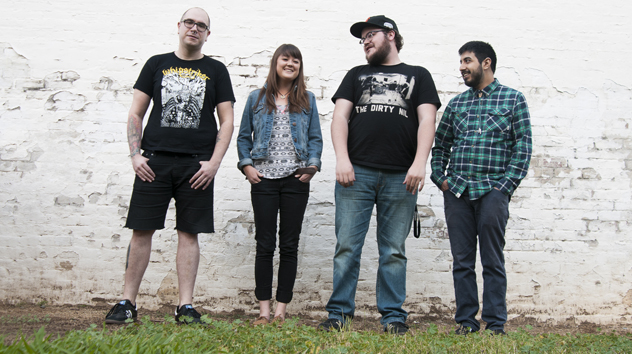
And while you typically don’t see many females in town wailing away behind the drum kit, Mayo is quick to dismiss the idea that being a woman in a band with three dudes is anything remarkable.
“I don’t think it’s any different than having a group of four guys or anything like that,” Mayo says, elaborating on the guy-girl dynamic in the band. “They’re just my three best friends, so we inspire each other, we drive each other nuts, we write good music, we write some bad music, it’s not that much different than [any other band out there] … I’m in a band with girls as well, [and] to me I don’t think gender plays a huge role in the dynamic.”
The band’s second EP, released earlier this year, was recorded by a mainstay in the local music scene—Patrick Hills, who is also a musician in the punk band Bastards of Young. However, it wasn’t something that the group banged out in a couple of weeks—quite the contrary, whenever the band and Hills had any free time they chipped away at bringing the 10-song record to life.
“We started recording it, I think, at the end of the 2013 and we didn’t actually finish recording ’til probably around the summer of 2014,” Wiegert explains. “And then it took a long time for us to find somebody to put it out and everything. But we recorded it with a guy named Pat Hills at his place called Earth Tone studio in Rocklin. It was a long process; finally just in the last few months we were able to put it out.”
And yes, for all of you movie buffs out there, the inspiration for the album’s title did, in part, come from the teen flick Space Camp as well as a bit of mix-up with the lyrics during the recording process.
“What happened was, we were listening to Cory record his vocals for one song and one of the lines I thought he [sang that] he was going to space camp, and I just kept singing it over and over again and then yeah [it just stuck],” McKinney explains.
“Also, I missed seeing movies where people went to space camp. It is a total ’80s/early ’90s thing,” Wiegert continues. “When I was a kid I always thought it sounded so cool.”
The artwork for the cover, a collection of ethereal jellyfish on a black and gray space-like background, was brought to life by a friend whose artistic vision spoke to the foursome.
“We had a few different ideas…but a friend of ours Jessica Vosburg drew up the cover and then I colored it just using Photoshop and such—she did a sketch of it in black and white and we colorized it,” Wiegert explains.
“She drew that probably early 2014—it was probably one of the first album cover ideas we had and we tried about 30 other things and that was the one we always came back to, so two years later we liked it and chose it,” Mayo continues.
So, a jellyfish walks into space camp…OK, bad joke, but check out Dead Dads at their upcoming show and get weird!
For more info, checkout Deaddads.bandcamp.com or their Facebook page.
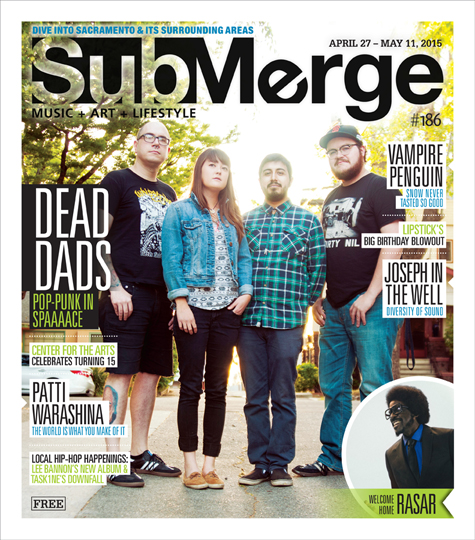
One Member’s Move to Oregon has ZuhG looking northward for future “Field Trips”
With the closing of the ZuhG Life Store in the Downtown Plaza last summer, Sacramento’s esteemed Hall of Fame ska-reggae-funk mashup band ZuhG has experienced a bit of a proximity shift since its lead singer and guitarist Bryan Nichols moved up to Lincoln City, Oregon. Rather than folding under the separation anxiety, however, ZuhG seems to be thriving following Nichols’ move. Their touring capacity has now easily stretched up the Oregon coast and even seeps a little bit into Washington, where they say they’d like to frequent more often.
They haven’t stopped making music, either. ZuhG is set to release their sixth studio album, Field Trip, through a CD release party at Harlow’s on March 14, 2015. They’ll also be touring starting in Sacramento and heading all the way through to Seattle.
Before they could do all that, though, ZuhG had one final mission for February: Saving Private Bryan from his Oregon beachside bliss, and bringing him back to Sacramento to put the final touches on their album via 10 hours of studio mixing and mastering—which Nichols says is about 96 percent done by now.
So the band set out on their mission. But instead of simply going to Oregon and coming right back (like most of us non-musicians would do) ZuhG took a few detours along the way and decided to embark on an unannounced, unnamed spur-of-the-moment mini tour.
“We didn’t name it because it’s so short,” Nichols says of their brief musical excursion. “Usually we’ll make a poster and give it a little name, you know?”
“The Pick-Up-Bryan Tour,” bandmate and fellow guitarist JR Halliday interjects. “We pretty much went to pick him up, we come back and then we go to the studio.”
Fresh off of stops in Eugene, Oregon and Arcata, California, ZuhG played their last show at the Powerhouse Pub in Folsom on Feb. 21, 2015, testing some of their newer songs on the dance-prone audience and even jamming out with a local violinist during their set, before having to wake up early the next morning and hit the Pus Cavern Studios for some final tweaks.
Submerge was able to catch up with Nichols and Halliday before their studio session that Sunday morning to ask them everything we possibly could about Field Trip, their upcoming tour, their newest songs and where ZuhG plans to go from here.
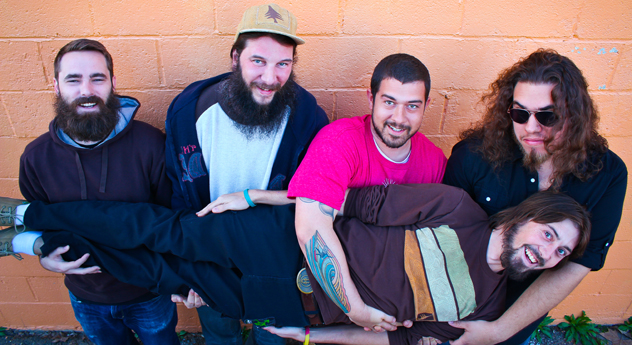
Why did you decide to name your new album Field Trip?
JR Halliday: Just going out on tour, you know? It’s like a field trip where you go to school and you get on the bus and you go off on a little adventure. It’s like little field trips. You know, it’s kind of what we do.
Bryan Nichols: I forget who said let’s make it that. But we were all like, yeah. Because like you said, we go on all our little trips and sometimes our tours are like two weeks long, so we almost don’t call them tours—we just call them trips. It’s like a field trip. Yeah, it’s very much so what we’re doing. You know what I mean? We’re like a group of friends, getting in our bus and going on a field trip. Like, “Let’s go to Eugene, let’s go to Arcata, let’s go to Seattle.”
I know you guys have a song called “The Hits” on your new album, which is about people requesting for you to play hit songs and famous covers. How did that song come about?
BN: So, I live in Oregon on the coast, you know, when we’re not touring. And I play this little restaurant gig a lot on the weekends, just in the corner of a restaurant. Like, people don’t really care I’m playing—I’m just kind of background noise, you know? But so often people will come up and to me and be like, “Hey, do you know any…” and I get the most ridiculous requests. Like Jimmy Buffett. “You know any Jimmy Buffett?” Or, “You know any AC/DC?” And some girl’s like, “You know some Bruno Mars? Or Adele?” Just ridiculous stuff that I wouldn’t sing. It’s like, “Yes, of course I’ve heard of that person before. But no, I’m not going to play an AC/DC song in this restaurant right now.” Nor do I know it… So it’s just a goofy song about that.
Bryan, how has your move to Oregon affected the band’s dynamic, if at all?
BN: I actually think this is working out better. I used to own a store in Sacramento called the ZuhG Life Store. And so after that store closed and just where I was in my life. I felt like I could finally move away and still make the band happen. You know? I would never leave until I felt like that—I mean, the members that we had and the way that we’d get down. So I saw my opportunity to move to the Oregon coast. I got a beach hut… I got lucky in a small little Oregon coastal town and I’m literally on the beach. It’s cool because now it’s opened up this whole realm of us playing in Eugene constantly and Portland and Seattle—just Oregon in general. We’ve just been tearing up Oregon lately as opposed to in the past, we were always going to San Diego and Hermosa Beach. We’re making our way up the coast a lot more, like every tour. So it’s cool because a lot of people when I was first moving there were like, ‘Aw, is the band breaking up?’ And I’m like, “No. Our band is just going to be playing more.”
So if anything, maybe the move up to Oregon has helped the band in some ways.
BN: I would say it’s broadened our reach. You know what I mean? We’re playing in other towns, and it’s nice.
I noticed from last night’s show that the band will just keep jamming sometimes, even if the original song is shorter. How much of a live set is pre-planned and how much is improvised like that?
BN: I mean, there’s definitely structure to some of the songs. Like, “Here comes Bryan singing a verse, or here comes a chorus.” But the bridges or the solos, who knows how long they’re going to be? You know? If Andre’s still shredding and he’s got his face on, we know not to go to the next part yet ‘cause he’s still in the middle of it. So yeah, there’s a lot of improv going on. But there’s also structure.
How’s it been after the ZuhG Life Store closed down? Do you miss it?
BN: I like to call it first and foremost a local music store. Like, we had a whole wall of just bands from Sacramento. So we were like a big merchant booth for that. And then it grew into music lessons and local art and shows in front of the store and local clothing companies. So local anything, you know? It was fun. I don’t regret it at all. I never thought I would own a store, and then an opportunity just kind of fell on my lap [and] I didn’t want to pass it up. It was great for the band, too. I like to think so many people in Sacramento just kind of know what ZuhG is or have heard of it because of that store… I had a lot of band members working there and helping out. It was demanding. You know, we were open damn near every day, during the mall hours we had to be open. So we only had a couple days and holidays [off]. It was super fun, and to see it go is sad, but I don’t miss owning a store. Although, I’ll drive by my Oregon coast town and see some building for rent or something. I’m always kind of like, “Hmm, I wonder how much that is.” I’m always kind of intrigued.
Is it possible that another ZuhG store could open up again, either here or in Oregon?
BN: It’s possible one day. I don’t have any plans right now, but I always think about it. And I got some friends who’d wanna do it too—like work there and sell their art and whatnot.
JH: It was very time-consuming, you know? We couldn’t just leave on tour. We had to make sure the store was covered. He was constantly on the phone talking to someone about some random thing for the store.
So, are you saying you’re happy that it closed down?
JH: I personally am. But I didn’t work there.
BN: Yeah, you didn’t do shit.
JH: I was like moral support. I’d show up, make an appearance.
Sounds like you’re more freed up to focus on your music.
BN: Yeah, it was definitely hard. Imagine going on a month-long tour and finding somebody to watch the store the whole time. It definitely frees up some time.
So what’s next for you guys? What’s your next move after this album, and where do you want to take ZuhG in the long run?
BN: Well, we’re always really excited about the festival scene. And we’ve playing a lot of festivals every time the time comes around. So we always focus on playing bigger and more festivals. That’s always it.
Do you see ZuhG going on a nationwide tour at some point?
JH: Absolutely.
BN: We have, and we’re going to again in October.
JH: Yeah, we’re going to Hawaii in August. So we just got five tickets.
Do you aim to be a touring band for the rest of your musical careers?
BN: Yeah. Bigger and better tours, always and constantly. The way I see it, for us to get bigger and go up to the next level, I want to go on tour with a band bigger than us and open for them every night. So I try to position ourselves to where we get to open for those bands, and one of these days one of those bands will be like, “Hey, I like you guys. You should come on tour with us.” I feel like that happens a lot. So that’s what I always try to do as far as getting to the next level. I try to find those opportunities for us, and hopefully it’ll work out.
Would you like ZuhG to achieve mainstream success and be radio-friendly one day?
JH: I think active would be a better word. Even if we’re making a little bit of money or no money, we’re still going to be doing it. We’ll stay play in our band and [ride] in our bus—whatever we have to get us from point A to point B.
Are you guys able to make a decent living doing music full-time?
BN: I got a beach house, man. We’re not rich, but you know.
JH: We all do our own thing, you know, our own little hustle to make ends meet as well…We don’t just rely on ZuhG to make our money and all that. At least us two.
So does ZuhG already have another project on its mind?
JH: Oh yeah. I’m already brewing up ideas upstairs. [Bryan’s] already got a bunch of songs that have been put on the table. But we gotta finish this one first. We started Field Trip before we came out with Calm and Clear.
Seriously?
BN: We had a drummer bail out. When we were recording Field Trip, one of our drummers quit. So then it just kind of turned into, “Let’s record an acoustic album with me and JR and our homegirl singer Jesi Naomi.” That’s basically all that’s on that album Calm and Clear. So we came out with that album because a drummer quit and we had all these acoustic songs.
I guess it’ll feel good to get this one out of the way then, huh?
BN: It’s been an idea for a long time, yeah.
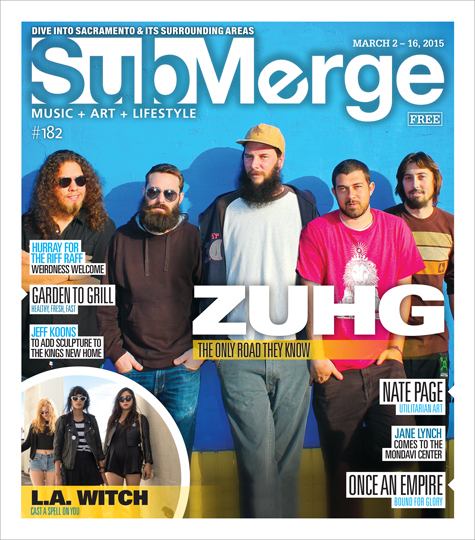
Don’t miss the release party of Field Trip at Harlow’s on Saturday, March 14, 2015. Groovincible and Dank Ocean will be joining ZuhG for the 10 p.m. show. $10 cover, 21-and-over.
I love Lee Spielman’s tweets. Sometimes you can tell he’s been smoking weed: “Antwon just showed me a photo of @JLo and said ‘Look @MelissaJoanHart got ass.’” Other times, you can tell he’s high out of his goddamn mind: “You ever stop and admire how nice someone’s front yard is?” And, on occasion, his tweets are downright frightening: “Talking to the Sacramento newspaper later today about playing our first show there in about 7 years. Might Marshawn Lynch the interview.” Ah, Lord. Do you know what is worse than an awkward interview? Nothing. So for the next day I was truly scared about talking with Spielman, the singer whose band Trash Talk I consider one of my favorites.
Trash Talk has been playing hardcore music for the past 10 years and the band has seen a dizzying amount of success, especially for such an aggressive, not-pop-friendly band. They’ve played huge festivals, gotten to work with incredible producers—like Steve Albini (on the Trash Talk album) and Alchemist (on No Peace)—and they even signed to the Odd Future label, which still confuses hardcore and punk purists to this day.
The band, known for their chaotic live shows where the crowd tends to break limbs and destroy venues, is 100 percent chaotic energy. So, needless to say, the prospect of talking with Spielman was exciting, and I had a lot of questions for the Sacramento native. I wanted to know what he thinks about his old hometown and why he left; I wanted to ask him about his collaboration with Odd Future; I was dying to hear him discuss his band’s wild reputation and some of the trouble he’s gotten into with Trash Talk; and I was also wondering why his publicist said he was working construction.
So, I guess the question is: Did Lee Spielman Marshawn Lynch this interview? Well, that’s up to you to decide.
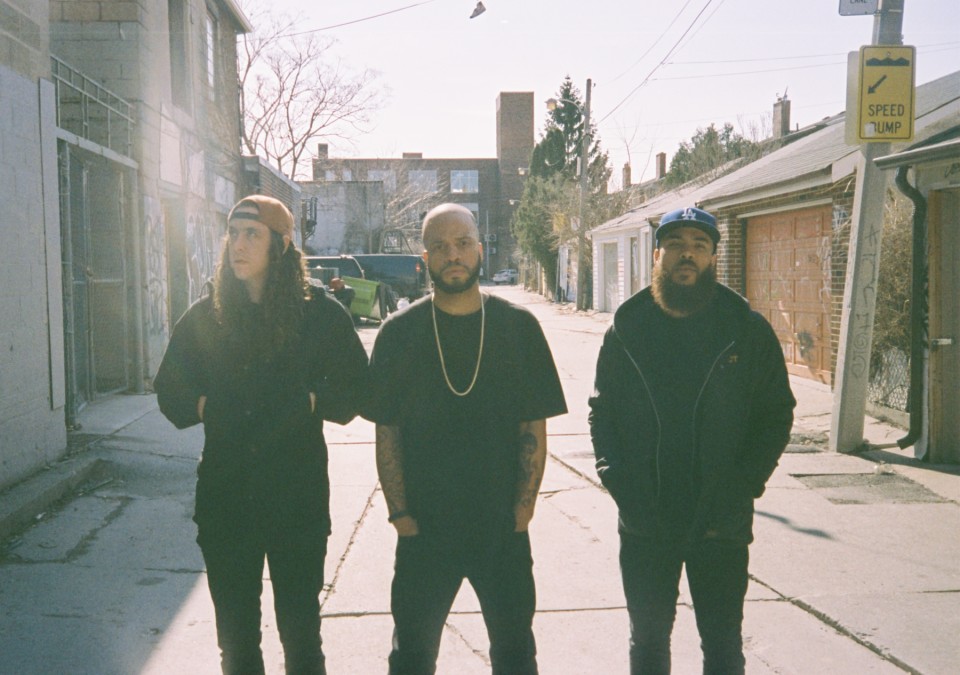
I was so stoked to see you still have a 916 number.
Yeah, I’ve had the same number since I’ve ever had a phone.
The publicist said you were doing construction.
No, I’m building something for us.
What are you building?
Just a bunch of shit for our tour. A bunch of crazy shit. I can’t really talk about it. You’ll see eventually.
Do you work on a lot of other stuff that’s not music?
Yeah, we’re working on a lot of shit. That’s why I’ve been building all fucking day. Working on a lot more stuff that’s outside the box. The last couple months we’ve been having a lot of fun doing creative stuff, from, like, art and ‘zines to collaborating with other artists and brands that we like and not keeping it so cookie cutter on our side.
Oh, OK. Man, I love No Peace. It’s so good.
I appreciate that, man. We were trying to do something different from the demos to what we have now. I don’t even know what the next stuff is going to sound like, but it’s just kind of boring to make the same music over and over. We all know by this point we know how to make short, fast, aggressive punk songs. It’s kind of fun to test ourselves, and we try to do that every time.
When you think back to the beginning of Trash Talk is it odd to think that your little hardcore band ended up being successful and you’re getting to tour and travel and things like that?
Yeah, it is weird. But, then again, it’s something I’ve always loved and have been involved in forever. So it’s weird, but I don’t know what else I would want to do. I’ve been involved with this stuff since I was a little kid, so it almost makes sense. And it’s kind of rad that it turned out the way it did. But I think [our success is] because ever since we started we’ve been 100-percent all the way.
What do you think you would be doing if you weren’t in Trash Talk?
I have no idea. I’d probably would have went to college and shit like that.
Is it weird that we still kind of claim you as a Sacramento band?
I did a lot of things there as a kid. We started playing there when I was a little kid. I booked shows there for the better part of high school years. It was almost like I could say that I learned how to be in a band and how to tour through booking shows in Sacramento.
Was that at Westcoast Worldwide?
Yeah. [Mike Hood] would leave for tour and me and my friend Jason T. would legitimately go to every single show there. We didn’t care what kind of band it was, whether it was a thrash band, a punk band, whatever. I don’t even think they knew my name until the first year. We went so many times and…we kind of took over for a little while. That taught me how to treat bands on tour—how to pay bands, how to book shows, how to promote shows. I kind of owe that whole area of us starting [to that period of time] because I booked all our first tours and it was like, “Hey, remember that time I booked you a show in Sacramento? Can you book me a show in New Jersey?” It was just kind of a tradeoff and punk and hardcore is cool for that. I met all my best friends like that.
Anthony Anzaldo from Ceremony was talking about Westcoast Worldwide and he remembers it being a huge pile of shit.
Yeah, it was a shithole. But it was our shithole, so it was OK.
Do you ever miss Sacramento?
Yeah, my family still lives there. Some of my best friends still live there. I’ve just been going so hard doing other shit. I don’t know, the day I turned 18 I got in our bass player’s car and drove straight to Seattle, and then I haven’t moved back home since then. But it’s been fun because I’ve lived in London, Seattle, Philadelphia, San Francisco, Richmond, Virginia. I feel like every kid should get out and see what’s up. Sacramento is a beautiful place and I’d be psyched to have a house there one day or some shit. I’m too young to be stuck there right now.
Do you think it was important for your band to get out of this place and just go?
I think we got to the point where it was like we were getting asked to play a lot of shows in Southern California and stuff and it was like, “Fuck it, let’s just go to Southern California. We drive there every weekend, anyway.” We all kind of moved apart. Our bass player was living in Bakersfield, our drummer in Los Angeles, our guitar player in Seattle, so one of the main reasons of me moving out was so we could all move to one place and operate as a unit. That helped us get a lot of shit done.
What has Odd Future helped you do?
There’s just other opportunities. It’s more like a whole new set of eyes and ears to work with on the creative side. And just kids in general. I don’t feel that punk and hardcore should be stuck to punk and hardcore kids. [Music should be] projected to someone that can make their own opinion to whether or not they like it, but a lot of time people don’t get the chance. Some kid at an Odd Future show may never have heard of anything like this, but the second he sees it he’ll know it’s his favorite shit. So I think it’s really important to do shit like that in general. Like, we’re coming through Sacramento with Ratking. We’re down to play with Wavves. Or a DJ. Or whatever. It doesn’t matter.
I never heard Ratking until I looked at your flyer and YouTube’d them. They’re really good.
That’s what it’s all about. Shit like that. And then vice-versa. There’s probably a kid in Sacramento who’s never heard of us and going to see Ratking and typed [Trash Talk] in and is like, “Damn, this is tight.”
Skateboarding has always had this connection between punk rock and hip-hop.
I’ve always said that forever. Like, Ratking, we’re going on tour with them. There may rap and stuff and we play a different genre or style of music, but at the same time we’re all the same kids. We got into music for a reason and we’re traveling with our friends, seeing the world, having fun—skating, tagging—doing whatever we want. At the end of the day, regardless of the genre, we’re kind of the same kids.
Since you guys are touring so much, do you ever just get tired out? Like you don’t even want to go on stage?
For sure. Sometimes I’m like, “This fucking sucks. I can’t do this.” But then maybe like 10 seconds before the first note it’s like, “Alright, this is OK.” Then five minutes into the set it’s like, “This is fucking sick.” Halfway through it’s like you forgot how you’re feeling. But this next tour is like 30 days. It’s definitely going to take its toll.
Have you ever played Harlow’s before?
No, I’ve never been there. Is it on J Street or some shit?
Yeah, it has a weird ‘80s lounge vibe. And VIP booths.
That’s tight. We haven’t played Sacramento in hella long. I’m curious to see what’s going to happen.
Do you guys get in a lot of trouble at your shows?
Yeah, a lot. It’s a blessing and a curse. It’s one of those things, people book us to play and they’re like, “Oh, I want this crazy show!” and they get it and they’re super bummed. The crowd’s not bummed. It’s usually the owners or some shit. But it’s not like we ever go out of our way to intentionally break anything. It’s usually not even us. It’s usually the crowd doing too much. We’ve been in trouble a shitload of times. We’ve had riots. We’ve had police shut down our shows. It’s kind of weird now. Every time we pull up, they know we’re pulling up and they have a list of rules of shit we can’t do before we walk in the building.
Is there one rule that people always have for you guys?
Don’t climb on shit.
Well, good, man. I’m glad you didn’t Marshawn Lynch me.
I thought about it.
Who knows what will happen when Trash Talk plays Harlow’s. That’s why you have to be there to find out. The show is March 16 and also features Ratking and Lee Bannon. Tickets for the all-ages show are $15 in advance and can be purchased at Harlows.com.
